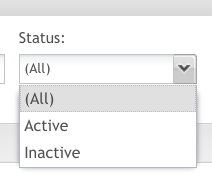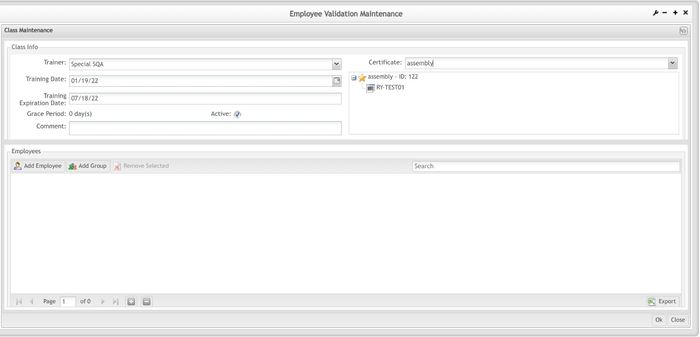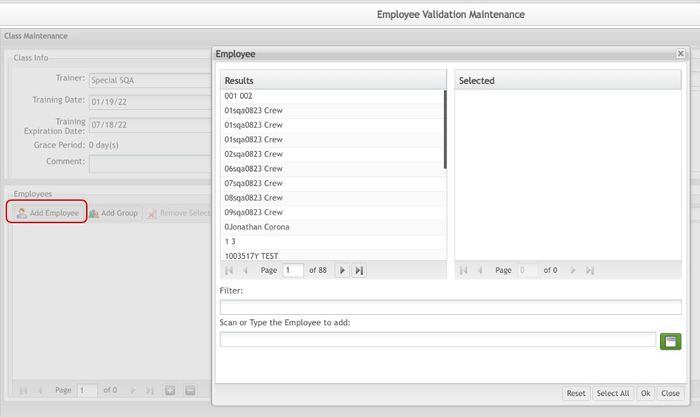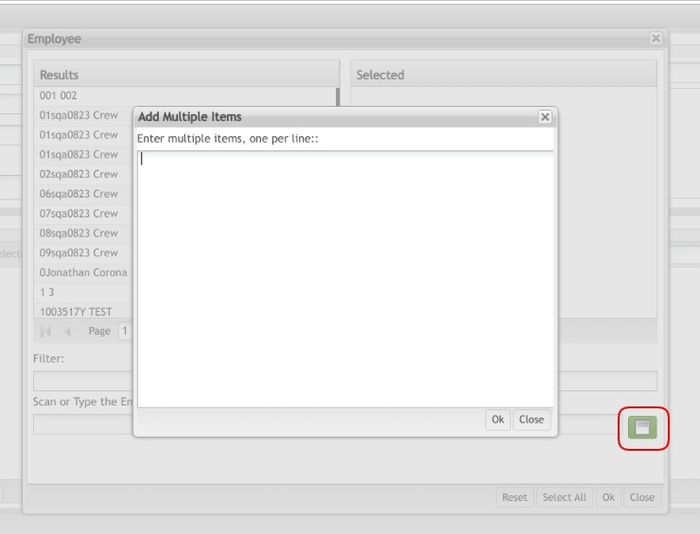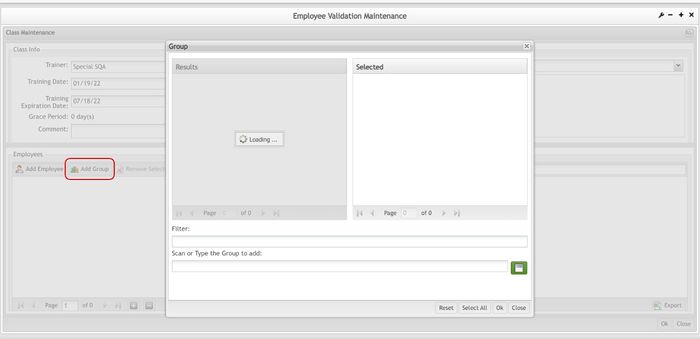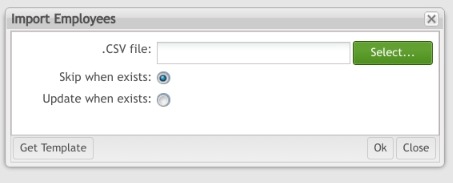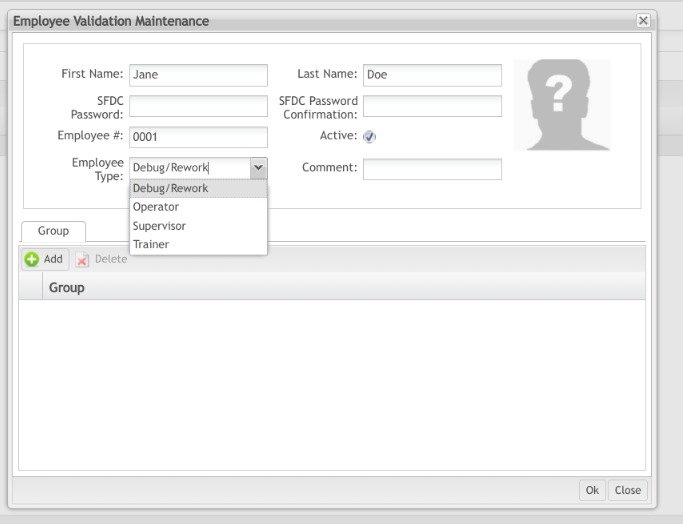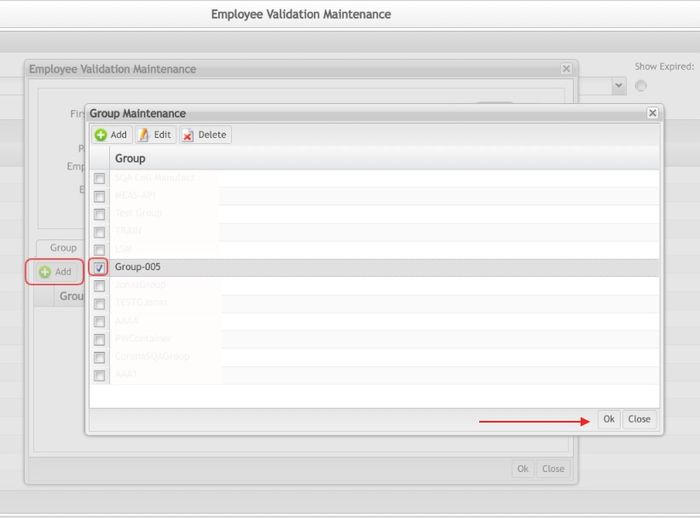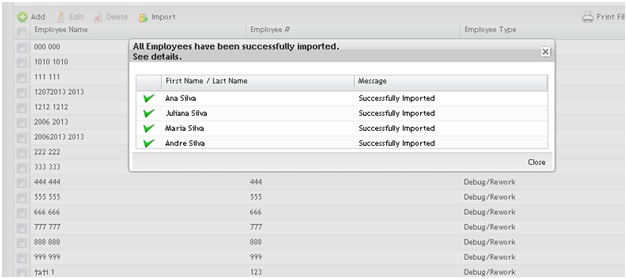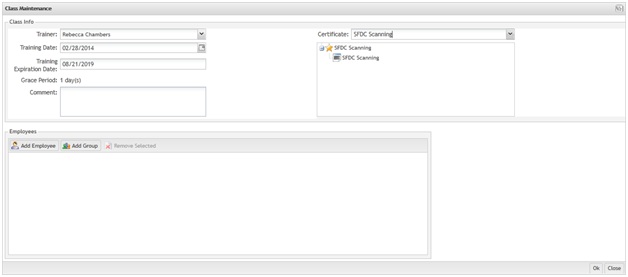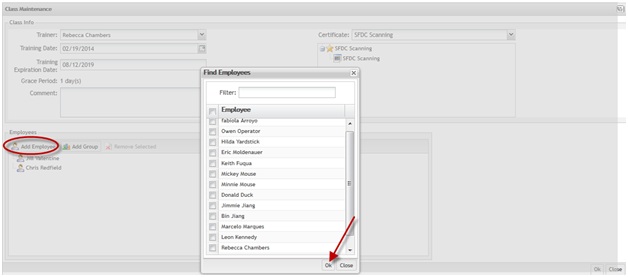SOP-42Q-MES0071 Employee Validation Maintenance
42Q Home > Quality > Employee Validation Maintenance
Contents
Quality
42Q has established itself as an organization that continuously pursues excellence in performance and quality in the areas of customer and demand management, supply chain management, product execution, and plant compliance.42Q has incorporated into 42Q the tools that allow users to monitor manufacturing efficiency and performance. These tools include a variety of Statistical Process Control (SPC) and Employee Validation portlets, such as the configuration of monitors, collection and analysis of data, viewing of charts, as well as employee and class maintenance.
Employee Validation Setup
This module is responsible for creating training that operators should perform to work in manufacturing processes. The whole operator control (registration and information maintenance), training, and certificates required for the operators working on the shop floor (mainly in medical plants) will be administered by this feature. Employee Validation is a manual input module that allows individuals working on the employee, other than those creating a new configuration and maintaining an existing one. It provides a method of creating employee/password/training records that can be administered by non-SFDC personnel and provides a method of identifying specific processes that must be controlled. It will still support the traditional login methods for data collectors without controlled processes.
Employee Validation is accessed using two paths:
- Shop Floor Control > Configuration > Employee Validation Configuration
- Quality > Employee Validation Maintenance
Figure 1: Employee Validation Maintenance Portal Location
Certificate Maintenance, EV Process Maintenance, and Process Group Maintenance sub-modules are available only through path 1, which is known as EV Configuration.
Employee Validation Maintenance
These instructions address the path 2 (EV Maintenance) sub-modules.
To access Employee Maintenance, navigate to Quality > Employee Validation Maintenance
The Employee Validation Maintenance page will display as follows:
Figure 2: EV Maintenance
Employee Validation Maintenance is composed of two sub-modules and these work instructions will help users to understand both.
- Class Maintenance
- Employee Maintenance
Class Maintenance EV CMLogo.jpg
Once the user has accessed the Employee Validation main page and selected Class Maintenance.
The Class Maintenance main page will display the following options in the header along with the Filter and Clear buttons to allow searches from the main class page.
- Show Expired
- Trainer
- Certificate
- Training Date
- Expiration Date
- Status
Figure 3: Class Maintenance Page
In Class Maintenance, users will be able to activate or deactivate the certificates and see the Status filter showing whether the user is Active or Inactive and a new Status column in the Class List.
Figure 4: Status Filter
When the class is Active the no tag will be shown, only if it is Inactive. Users are able to Add, Edit, Copy, Import, and Print classes.
Figure 5: Menu
Adding Classes
To add a class, users need to click on the ![]() button in the menu bar. A new Class Maintenance page will display.
button in the menu bar. A new Class Maintenance page will display.
Figure 6: Class Maintenance
Users have to select the Trainer, the Certificate, and the Date for training from the drop-down list. When the certificate is selected, the Grace Period and Training Expiration Date will automatically be filled. Next, users have to select the ![]() button from the Class Maintenance page. The Find Employees pop-up will display.
button from the Class Maintenance page. The Find Employees pop-up will display.
Note: The class must have at least one assigned certificate.
Figure 7: Add Employees
This option allows users to select one or multiple employees from the list; users can click Reset to clear the selection, click Ok to add the employees, or Close to cancel the action.
Users can add multiple items at a time by clicking on the ![]() icon, this option will pop up a new window to allow users to enter multiple items.
icon, this option will pop up a new window to allow users to enter multiple items.
Figure 8: Add Multiple Items
Adding Employee Groups
To add employee groups, click the ![]() button from the Class Maintenance page. The Find Groups pop-up will display to find groups.
button from the Class Maintenance page. The Find Groups pop-up will display to find groups.
- Select a group and click on Ok to add the employee group, or Close to cancel. Both groups and employees will be displayed in the employees list.
Figure 9: Add Employees Groups
Note:The add employees by the group is a way to make adding employees fast and EV does not store group information (i.e. if the selected group has a new employee added in the future, he or she will not be added to the class).
Editing Classes
To edit classes, select the class to be edited and click on the ![]() button. Follow the same steps performed to Add Classes. Click Ok to complete the changes, or Close to cancel.
button. Follow the same steps performed to Add Classes. Click Ok to complete the changes, or Close to cancel.
Figure 10: Editing Classes
Note: Classes cannot be deleted.
Import Class
The ![]() button allows users to be massively imported to the system using a CSV spreadsheet.
button allows users to be massively imported to the system using a CSV spreadsheet.
Figure 11: Import Class
When the ![]() button is selected, it will automatically download a PDF file with the class information.
button is selected, it will automatically download a PDF file with the class information.
Employee Maintenance 
Employee Maintenance displays a list of all employee names, types, and numbers. The user can search the list by entering data in the filter fields, editing employees, or deleting employees.
Figure 12: Employee List
Users are able to perform searches, sort, add, edit, delete, import, and print/export employees.
Performing Searches
For searches, the following filtering capabilities are provided: Employee #, Employee Name, Employee Type, Employee Group, Certificate, Process, and the Active/Show Expired flags.
- Perform a search by using one or more of the filtering options provided and selecting Filter. The results are then displayed in the Employee list.
Figure 13: List and Search Employees
Note: It is possible to list only the active employees by checking the Active box.
Adding Employee
This portlet allows adding employees to the application. Employee records can be added individually. Also, a user may import a number of records.
- To Add Employees, select Add from the Employee Maintenance main page. A pop-up screen will appear that will allow the user to enter the information of an employee:
Figure 14: Adding Employee
- Complete the mandatory fields: First Name, Last Name, Password, Password Confirmation, and Employee #.
- Select an Employee Type from the drop-down box:
- Debug/Rework refers to the production personnel who perform work with debugging/rework roles.
- Operators refer to the production personnel who perform work. They require certification to perform a process.
- Supervisors refer to superusers who can scan serial numbers through any process without having the actual certification, but are nevertheless required to be in EV and have at least one certificate.
- Trainers refer to the type of personnel used to create a class. Someone has to be a designated trainer in order to create a class in EV. They are also the people typically holding classes and performing any hands-on training.
- Assign the new employee with at least one group (see instructions below).
- Select Ok. (The user is given the option to add an employee picture at this time.)
Assigning Employees to Groups
An employee should be assigned to at least one group. Follow the instructions below to assign users to a group.
- To assign Employees to groups, click Add in the employee pop-up window. The employee group pop-up window will appear.
- From the group list in the pop-up, check the box of the groups to assign to the employee.
- Select Ok to complete the assignment, or Close to cancel.
Figure 15: Assigning an Employee to a Group
Users can also add new groups, edit and delete them.
Importing Employees
The button allows users to be massively imported to the system using a CSV spreadsheet.
- To import employees, click on Import on the Employee Maintenance main page. The import employee pop-up window will display.
Figure 16: Import Employees
Note: If “Skip when exists”is selected, the user will not be updated if it is already existing in the system.
- The user may import a local spreadsheet by clicking Select and uploading the file. If a local spreadsheet has not yet been created or is not otherwise available, the user may select Get Template to download a CSV file that is organized so that the user can immediately enter the information correctly. Once the spreadsheet is created, the user can then import it using the Select feature.
- Once a CSV has been selected for import, click Ok to proceed with the import (or click Close to cancel). A popup will appear, showing the import results.
Figure 17: Import Employees Results Pop-up
Performing Searches
For searches, the following filtering capabilities are provided: Employee #, Employee Name, Employee Type, Employee Group, Certificate, Process and the Active/Show Expired flags.
1. Perform a search by using one or more of the filtering options provided and select Filter. The results are then displayed in the Employee list.
Figure 4: List and Search Employees
SOP-5-I-MDS0023-C-MDS Employee Validation 04.jpg
Note: It is possible to list only the active employees by checking the Active box.
Adding Employee
This portlet allows adding employees in the application. Employee records can be added individually. Also, a user may import a number of records.
1. To Add Employees, select Add from the Employee Maintenance main page. A pop-up will appear that will allow the user to enter the information of an employee:
Figure 5: Adding Employee
SOP-5-I-MDS0023-C-MDS Employee Validation 05.jpg
2. Complete the mandatory fields: First Name, Last Name, Password, Password Confirmation, and Employee#.
3. Select an Employee Type from the drop-down box:
- Trainers refers to the type of personnel used to create a class. Someone has to be a designated trainer in order to create a class in EV. They are also the people typically holding classes and performing any hands-on training.
- Operators refers to the production personnel who perform work. They require certification to perform a process.
- Supervisors refers to superusers who can scan serial numbers through any process without having the actual certification, but are nevertheless required to be in EV and have at least one certificate.
- Debug/Rework refers to the production personnel who perform work with debug/rework roles.
4. Assign the new employee with at least one group (see instructions below).
5. Select Ok.(The user is given the option to add an employee picture at this time.)
Assigning Employees to Groups
An employee should be assigned to at least one group. Follow the instructions below to assign users to a group.
1. To assign Employees to groups, click Add in the employee pop-up window. The employee group pop-up window will appear.
2. From the group list in the pop-up, check the box of the groups to assign to the employee.
3. Select Ok to complete the assignment, or Close to cancel.
Figure 6: Assigning an Employee to a Group
SOP-5-I-MDS0023-C-MDS Employee Validation 06.jpg
Importing Employees
The Import portlet allows employees to be massively imported to the system en masse using a CSV spreadsheet.
1. To import employees, click on Import in the Employee Maintenance main page. The import employee pop-up window will display.
Figure 7: Import Employees
SOP-5-I-MDS0023-C-MDS Employee Validation 07.jpg
Note: If Skip when exists is selected, the user will not be updated if it is already existing in the system.
2. The user may import a local spreadsheet by clicking Select and uploading the file. If a local spreadsheet has not yet been created or is not otherwise available, the user may select Get Template to download a CSV file that is organized so that the user can immediately enter the information correctly. Once the spreadsheet is created, the user can then import it using the Select feature.
3. Once a CSV has been selected for import, click Ok to proceed with the import (or click Close to cancel). A pop-up will appear, showing the import results.
Figure 8: Import Employees Results Pop-up
Print Filtered Employees
1. To print a list of employees in the search results, click on the Print Filtered Employees button. A PDF report is generated with classes, certificates, and processes, which the user can then print or save.
Figure 9: Exporting Employees
Figure 9 Print Filtered Employees.jpg
Editing Employees Information
Figure 10: Editing Employee Information
SOP-5-I-MDS0023-C-MDS Employee Validation 10.jpg
It is possible to edit the employee information by selecting the employee, and clicking Edit.
The steps to edit employees are the same as that for adding employees. See the Add Employee section above for more information.
Deleting Employees Information
Delete an employee by selecting the employee, and selecting Delete.
Figure 11: Deleting Employees
SOP-5-I-MDS0023-C-MDS Employee Validation 11.jpg
Note: The deleted employees will also be removed from classes. The portlet does not allow removing a trainer that is assigned to a class.
Class Maintenance
To access the Class Maintenance, navigate to: Quality
>
Employee Validation, and select Class Maintenance from the Employee Validation main page. The Class Maintenance main page will display.
Figure 12: Class Maintenance SOP-5-I-MDS0023-C-MDS Employee Validation 36.jpgThe user is able to add, copy or edit classes, and perform searches from the main class page.
Adding Classes
Figure 13: Add Class
1. Click on Add Class in the Menu bar. The Class Maintenance page will display.
Figure 14: Class Maintenance
2. Select the trainer, the certificate, and the date for training from the drop-down list. When the certificate is selected, the Grace Period and Training Expiration Date will automatically be filled.
3. Next, select Add Employee from the Class Maintenance page. The Find Employees pop-up will display.
Note: The class must have at least one assigned certificate.
Figure 15: Add Employees
4. Select employees from the list, and click Ok to add the employees, or Close to cancel the action.
